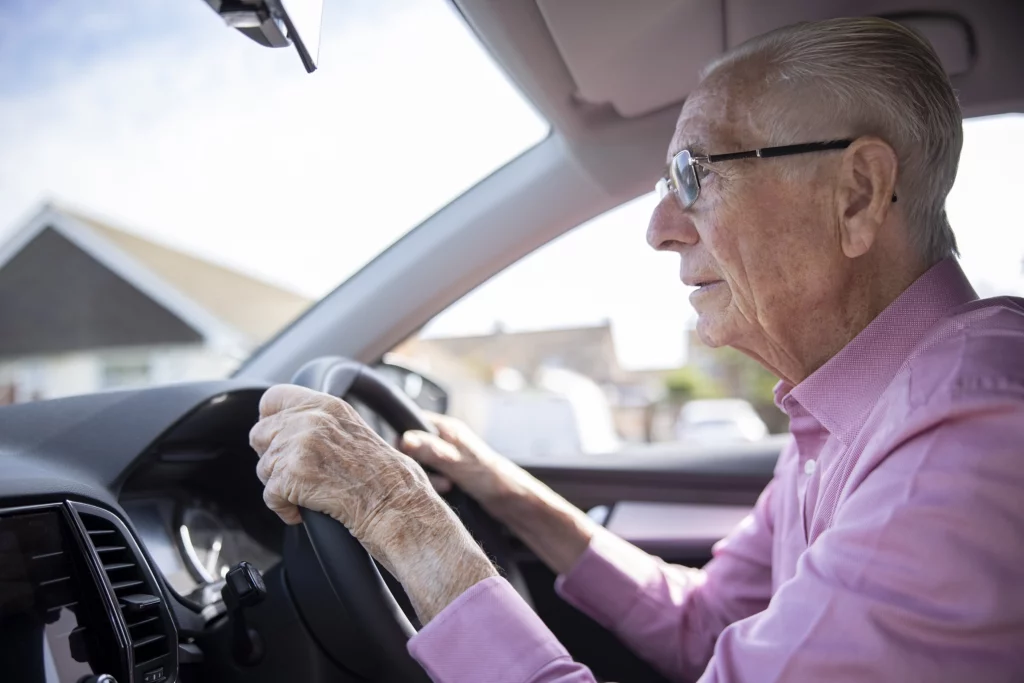
Driving with Dementia – Is it time to take the Keys?
This post may contain affiliate links or Google Ads and we may earn a small commission when you click on the links at no additional cost to you. As an Amazon Affiliate, we earn from qualifying purchases. This is at no additional cost to you and helps with our website expenses.
Driving with dementia makes it difficult for a person to safely drive a car. If you know or are caring for someone who has dementia and they still insist on driving, it’s important to be aware of the signs that it’s time to stop them from getting behind the wheel.

What is Dementia and How does it Affect Driving Abilities?
Dementia is a decline in mental abilities due to injury or disease. It can affect memory, thinking, language, judgment, and behavior. While it is most common in older adults, dementia is not a normal part of aging. Driving is a complex task that requires attention, good judgment, and quick reflexes. Dementia can impair these abilities, making it unsafe for someone with the condition to get behind the wheel.
A study reports that people with dementia are more likely to sustain serious injuries or death from a traffic accident. If you or someone you know has been diagnosed with dementia, it’s important to have a conversation about driving. With the help of a doctor or other health care provider, you can make a plan for when it’s time to stop driving. Taking away the keys can be a difficult decision, but it may be the best way to keep everyone safe on the road.
Signs that it might be Time to Stop Driving with Dementia
For most of us, driving is an essential part of life. It allows us to get to work, go on vacation, and run errands. But for those with dementia, driving can become a dangerous proposition. If you or a loved one has been diagnosed with dementia, here are some signs that it may be time to stop driving:
- Forgetting the rules of the road: One of the early signs of dementia is memory loss, which can make it difficult to remember the rules of the road. If you find they are forgetting to signal or having trouble following directions, it may be time for them to stop driving.
- Difficulty staying in the lane: Dementia can also cause problems with coordination and depth perception, making it harder to stay in the lane while driving. If they are veering into oncoming traffic or off the road entirely, it’s time to hang up the keys.
- Getting lost in familiar places: An early sign of dementia is getting lost in familiar places. If they are constantly getting lost while driving, even in familiar areas, it’s time for them to give up driving.
- Poor judgment: Dementia can affect the ability to make sound judgments, which can be dangerous when driving. Misjudging how long a yellow light lasts is a good example.
- Will not let others ride with them. They may not want others to see just how difficult it is for them to drive safely.
- Will not take a driving test. It may be anxiety-inducing to think about having to take a driving test…knowing they will likely fail.
- Gets upset with other drivers and blames them for their own driving mistakes.
If you or a loved one is showing signs of dementia, it’s important to talk about driving safety before an accident happens. With early intervention, you can help keep yourself and others safe on the road.
How to Talk to a Loved One about Giving up Their Driver’s License
For many people, driving is a symbol of independence. It can be hard to give up that independence, especially when it’s taken away by someone else. If you have a loved one who is showing signs of dementia, it may be time to have a conversation about giving up their driver’s license. Here are a few tips:
Pick the right time and place: Choose a time when your loved one is feeling calm and relaxed. Avoid bringing up the subject in a stressful or chaotic environment.
- Be honest and direct: Explain your concerns and why you think it’s time for them to stop driving. Be prepared to answer any questions they may have.
- Listen and empathize: Allow your loved one to express their feelings about giving up driving. Show them that you understand how difficult it is for them.
- Offer support: Let your loved one know that you’re there for them and will help them through this transition. Offer to drive them places or help them with errands.
- Talk to their doctor. It may help if their doctor tells them they can no longer drive.
What Happens When Someone with Dementia gets Pulled Over?

When a police officer pulls over a driver with dementia, the situation can quickly become complicated. The driver may not be able to understand the officer’s instructions or may become agitated and aggressive.
In some cases, the driver may even attempt to flee the scene. As a result, police officers must approach these situations with caution and patience. They may need to call for backup or request assistance from a trained medical professional. In some cases, the officer may simply issue a warning and allow the driver to continue on their way.
However, if the driver poses a danger to themselves or others, the officer may need to take more drastic measures. Ultimately, each situation is unique and must be handled on a case-by-case basis.
Hallucinations and Delusions when Driving is a Real Danger
Hallucinations and delusions can cause drivers to see things that aren’t really there, which can lead to accidents. Hallucinations and delusions are very common in the early stages of Lewy Body Dementia. They may see people in the road when they aren’t there. It might appear to them that animals are on the road. They might be afraid that someone in their car is trying to sabotage them.
If they are pulled over by the police they might hallucinate a completely different scenario and do something to try and hurt the officer or try to run away. People with dementia that have hallucinations and delusions should not be driving. Period.
Driving with Dementia – Car Insurance Issues
Driving with dementia can pose a serious risk to both the driver and other motorists on the road. In many cases, it can be difficult for those with dementia to maintain their focus and stay within the lines of the road. Additionally, dementia can cause problems with short-term memory, making it difficult for drivers to remember where they are going or how to get there.
As a result, many car insurance companies have strict policies in place for drivers with dementia. Their liabilities are exponentially increased when someone drives with dementia. In some cases, insurers may refuse to cover drivers with dementia or may only offer limited coverage. As a result, it is important for those with dementia to research their options carefully before choosing a car insurance policy.
If a person with dementia is not allowed to drive by their doctor, or if they have had their driver’s license taken away, the insurance company does not have to pay for any damage from an accident, even if the person with dementia was not responsible for the accident.
Laws Regarding Driving with Dementia
While there is no federal law in the United States specifically addressing driving with dementia, many states have enacted their own laws on the matter. These laws generally fall into one of two categories: those that require doctors to report patients with dementia to the state DMV, and those that allow family members or other caregivers to request that a person with dementia be evaluated for their driving ability. Some states have both types of laws in place, while others have only one or the other.
The reporting laws vary from state to state, but typically require doctors to notify the DMV if they believe a patient has dementia or another condition that could impair their driving ability. The evaluation laws also vary, but typically allow family members or other caregivers to request an evaluation of a person with dementia. In some states, the evaluation must be conducted by a licensed driver rehabilitation specialist, while in others any licensed driver examiner can conduct the evaluation.
There is no easy answer when it comes to driving with dementia. For some people, the ability to drive gives them a sense of independence and freedom, and taking away that ability can be devastating. On the other hand, driving with dementia can be extremely dangerous, both for the person with dementia and for others on the road. Ultimately, it is up to each individual state to decide what is best for its citizens.
Conclusion. Dementia is a debilitating disease that not only robs the sufferer of their memories but also impairs cognitive function and judgment. This can make driving very dangerous, not just for the person with dementia, but for everyone else on the road. If you notice any of the signs that it might be time to stop driving, have a gentle conversation with your loved one about giving up their license.
Be prepared for resistance and emotion, but try to remain calm and understanding. It’s important to remember that this decision is ultimately in their best interest and will keep them – and others – safe. If someone with dementia does get pulled over by the police, there are steps you can take to diffuse the situation. And finally, be aware that car insurance companies may refuse to cover someone who is driving with dementia. While this can be a difficult situation to deal with, knowing what to expect ahead of time can help ease some of the stress involved




